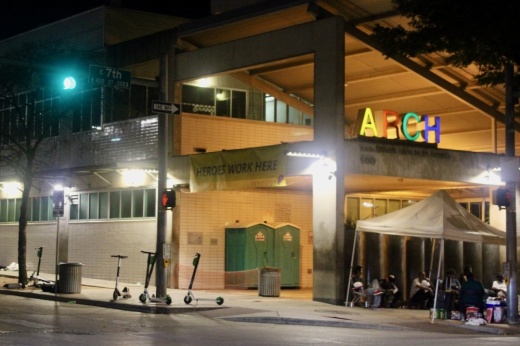Public health officials said City Council was informed in early July that Front Steps would be ending its work at the city-owned ARCH, located at 500 E. Seventh St., after the nonprofit's current contract with the city expires in September. Front Steps has received millions of city dollars to manage the homeless resource center since beginning its work there in 2004.
The ARCH has the capacity to shelter dozens of people on a nightly basis, and it also offers a range of workforce, legal and health care services. As the lone city-owned shelter downtown, the facility has been at the center of discussions regarding Austin's homeless strategy for years and has weathered events such as capacity cuts and local camp clearings in recent years.
With little time to find a replacement at ARCH this month, city staff met with several nonprofits to gauge their interest in stepping in for Front Steps. Austin Public Health Director Adrienne Sturrup said an emergency contracting process yielded one interested party: California-based Urban Alchemy.
Council is set to vote July 28 on a $4.14 million agreement with Urban Alchemy that would establish the nonprofit as the ARCH's operator for 13 1/2 months. Funding would come from Austin Public Health's budget. Officials signed off on an extension to its $1.83 million agreement with Front Steps for shelter operations last September.
Ahead of that vote, officials and staff reviewed the proposal—and some reservations about Urban Alchemy's entry into Austin's homeless service network—during a July 26 work session.
Several council members expressed concerns that the nonprofit may not be the best fit for the city given its operational history and other possible red flags. Reporting from West Coast outlets including the Pacific Sun, San Francisco Chronicle and San Francisco Examiner detail multiple lawsuits and complaints faced by Urban Alchemy ranging from a UCLA Luskin Institute report on the group's "mercenary" behavior to allegations against its employees such as drug distribution and sexual assault.
"I’m super concerned, as I know many of you probably are as well, about the situation," District 9 Council Member Kathie Tovo said at the start of the discussion.
According to Sturrup, staff determined that bringing the nonprofit to the ARCH would be "reasonable and sound" following their evaluation of the organization. And she said a conversation she had with Chris Zapata, city manager of Sausalito, California, revealed "nothing but good things" about Urban Alchemy's track record with that city's homeless population.
However, she also said that Urban Alchemy comes to Austin with experience managing shelters that were likened to a "day spa" by CEO Lena Miller rather than the traditional, more "institutionalized" shelter spaces in use locally. Despite that, Sturrup said Miller confirmed the nonprofit will adapt to the city's needs at the ARCH.
"She was very clear that congregate shelter was not part of their model, but because they believed in Austin and they knew that there were people who needed to be served, she was willing to revert back to providing that for us because that’s what we’re requiring at this time," Sturrup said.
Homeless Strategy Officer Dianna Grey also noted that the proposed contract is not long term and that city staff can evaluate whether to continue a partnership with Urban Alchemy with more lead time next year. And Sturrup said the group's existing connections in the city mean it will not enter the scene blind in order to immediately fill the ARCH vacancy.
"The time period is important because we really want to be able to allow for that smooth transition between Front Steps," she said. "Our department will continue to support this organization with whatever resources that we can bring to bear to make sure that they’re successful in providing services for us. Understanding it is a risk, but it is a calculated risk which we have considered very carefully.”
Officials also said the operator contract—if approved—should come with close oversight from the city. District 5 Council Member Ann Kitchen called for on-site reviews and check-ins to ensure compliance with local rules for service providers, and District 7 Council Member Leslie Pool asked if Austin can implement safeguards such as a requirement that nonprofit staff carry identification while on duty at the ARCH. Sturrup also said that, if it is determined Urban Alchemy is not the right fit, Austin can terminate the contract.
Mayor Steve Adler shared some of his colleagues' reservations but said, given a lack of any other viable alternatives at the moment, the nonprofit may be the city's only option for now.
“This is a difficult situation. And difficult situations, there is seldom a really good answer. There’s the best answer," he said. "As best as I can tell, everybody that I have grown to trust and respect and have faith in, in this environment ... are all suggesting that this is the right direction for us to go, and I’m not going to substitute my discretion for theirs in this instance.”
Homeless service updates
In addition to finding a new ARCH operator, the city is also seeking to replace Front Steps as operator of its Southbridge shelter off I-35. A $4.22 million agreement with the Austin Area Urban League for that work is on council's July 28 agenda.
Officials could also:
- extend a lease on Riverside Drive for Integral Care's Safe Haven program for veterans experiencing homelessness;
- approve a $1.17 million agreement with Family Eldercare for permanent supportive housing services at Pecan Gardens—a facility that is now the subject of legal action from Williamson County;
- approve a $900,000 agreement with Foundation Communities for permanent supportive housing services at Balcones Terrace;
- send $90,000 in American Rescue Plan Act dollars to fund two new fellows in Austin's Homeless Strategy Division;
- finalize a $11.44 million spending plan for the city's HOME American Rescue Plan funds; and
- establish a new benchmark for the frequency of local point-in-time counts used to evaluate the local homeless population. A count was last completed in 2020.





